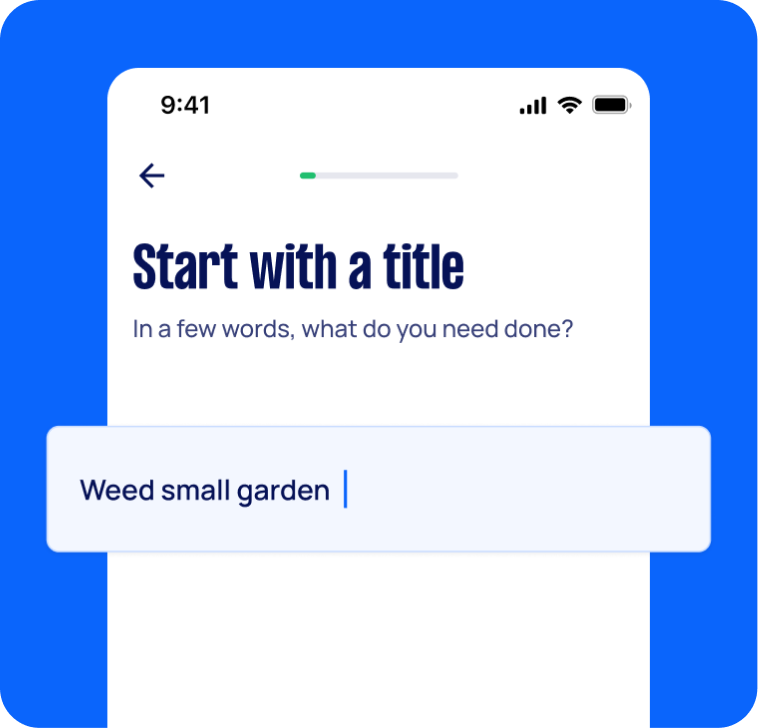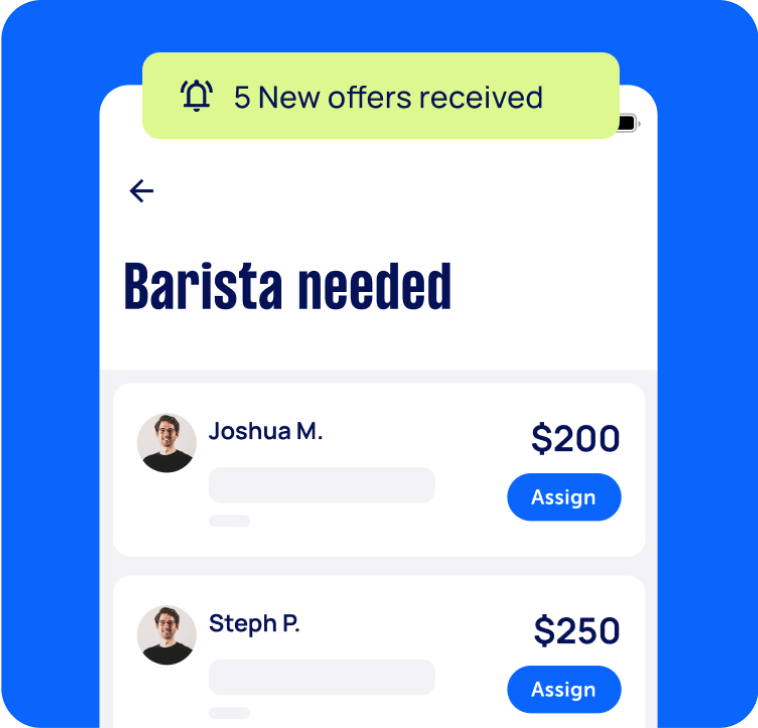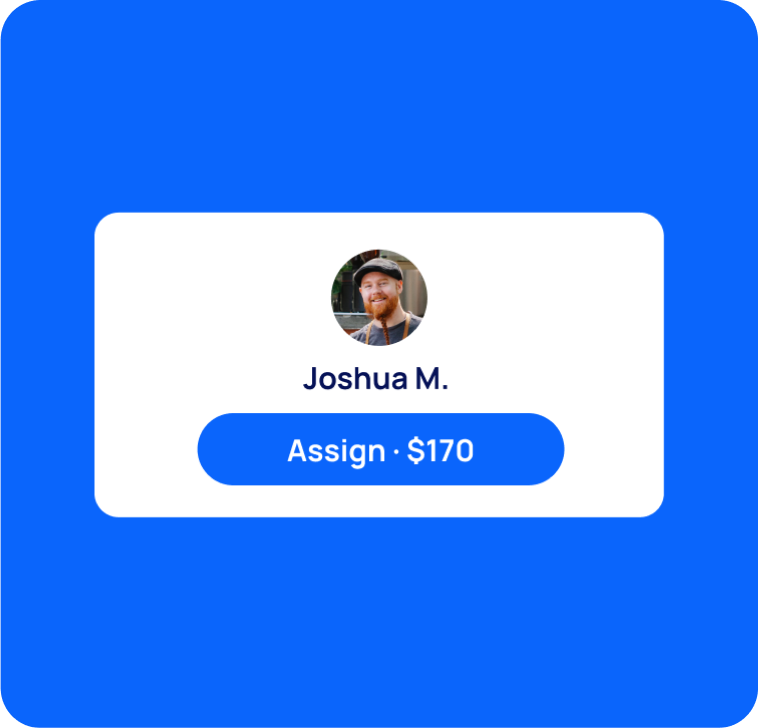

Find a local depression counsellor near you
Fill in a short form and get free quotes for professional depression counselling near you
Excellent rating - 4.3/5 (9300+ reviews)
When you're struggling with depression
- Counselling for depression
- Postnatal depression counselling
- Postpartum depression counselling
- Counselling for anxiety
- Online therapy
- … or anything else
What is Airtasker?

Post your task
Tell us what you need, it's FREE to post.

Review offers
Get offers from trusted Taskers and view profiles.

Get it done
Choose the right person for your task and get it done.
Why book a depression counselling service through Airtasker?
Searching for a depression counsellor can be a nerve-racking and tedious process. But Airtasker offers an easier way to find the right counsellor for you. Put up a task now to start connecting with rated and reviewed depression counselling services. Our platform lets you look through counsellor profiles and client reviews.
As a result, you can skip the guesswork and uncomfortable experience of asking around for recommendations. We also offer a convenient way to find affordable counselling services you can trust. Simply set your budget, and get free quotes from counsellors with relevant experience. Get in touch with experienced counsellors who may offer competitive rates. Airtasker is a smart alternative to the mainstream and often-expensive online counselling platforms.
Whether you need private counselling or group counselling services near you, we’re here to help! Select the pink ‘Post a task’ button now to start your search for reliable and affordable depression counsellors. Working through your depression may be a challenging process, but the search for the right counsellor doesn’t have to be.
Stay insured
Relax knowing that your [] comes insured when you hire them through Airtasker.
Flexible pricing
Choose the offer that’s right for you.
Get the best taskers
Judge for yourself – every task gets a review.
Quick offers
Start getting offers to do your task ASAP!
Top Depression Counselling related questions
Tell us about your mental health concerns so that you can connect with a suitable depression counsellor. For example, you can provide some general information on what issues you’re struggling with. You may also specify a personality type you’re looking for in a counsellor. Once you get offers, you’ll be able to check counsellors’ ratings, reviews, and certifications. If you prefer in-person sessions, we can connect you with depression counselling services near you.
You can book as many counselling sessions as you need on Airtasker. Feel free to book a one-time session to feel things out with a new therapist. Or book several sessions with a counsellor you feel comfortable with. In general, the number of sessions you’ll need will depend on the severity of your depression and the issues you’re working with.
A counsellor may or may not have the necessary training and skills to provide psychotherapy. Meanwhile, a therapist can provide psychotherapy and would have a more advanced degree (e.g. Psychology PhD or PsyD). Counselling focuses on present problems and is usually more short-term than therapy. Psychotherapy is big picture-oriented and deals with chronic and recurrent problems.
No, depression counsellors do not diagnose mental disorders nor prescribe medications. If you need a prescription, a psychiatrist is an expert you need to see. Counsellors may know how diagnosis works, but they’re not trained to provide formal diagnoses. A counsellor focuses on psychological ways to treat depression. Nonetheless, your counsellor may refer you to a psychiatrist or work closely with one to provide you with treatment.
Online therapy may be as effective as face-to-face therapy. According to a 2018 study in the Journal of Psychological Disorders, online CBT may produce the same results as in-person therapy. If you can’t find depression counsellors near you, then online therapy is a practical alternative. Still, the effectiveness of online therapy varies from person to person. The key is to find a method of therapy that works for you.
Put some thought into your goals. You don’t need a detailed list from the get-go, but it helps to know the general reasons you’re seeing a counsellor. Also, you may write down the topics and questions you’d like to cover during your session. Preparation can ease your anxiety about speaking with a counsellor for the first time. What’s more, preparation can help you get the most out of your session.
Counselling & Therapy Services
Art Therapy
Anxiety Counselling
Psychologist
Family Therapy
DBT Therapy
Bereavement & Grief Counselling
Speech Therapy
Child Counselling
Mental Health Services
Group Therapy
EMDR Therapy
Cognitive Behavioural Therapy
Marriage Counselling
Sleep Therapy
Teen Counselling
Christian Counselling
Alcohol Counselling
PTSD Therapy
Anger Management Therapy
Eating Disorder Therapy
Divorce Counselling
Related Services near me
Top Locations
What do depression counselling services include?
Common depression treatment methods include cognitive behavioural therapy, interpersonal therapy, and psychodynamic therapy. Dialectical behaviour therapy is also another way to treat depression.
People with depression may use a blended approach or focus on one type of treatment, depending on their needs. Here’s an overview of counselling and therapy services you may consider for depression treatment.
Cognitive behavioural therapy (CBT)
Cognitive behavioural therapy aims to modify distorted and debilitating thought patterns. CBT combines cognitive therapy and behavioural therapy. Cognitive therapy focuses on moods and thoughts, while behavioural therapy targets actions. A CBT specialist would help you identify your negative thought patterns and responses to stressful situations.
Through CBT, you may learn more balanced and positive ways to respond to stressors. Your therapist may recommend additional activities like journaling, painting, or learning a new skill to support your recovery.
Interpersonal therapy (IPT)
Interpersonal therapy deals with a patient’s difficulties with their personal relationships. Your therapist may start IPT by conducting an interview wherein you describe your problems. This initial session can help your therapist identify your issues and outline a treatment plan in line with your goals. Typically, an IPT program lasts up to 20 weeks, with each session lasting one hour. IPT may help treat depression relating to significant life changes like a move, job loss, or the end of a marriage.
The goal of IPT is to reduce depression and improve relationships. IPT may teach you ways to communicate better with others, such as a partner or family members. People with social anxiety may also opt to get public speaking lessons to improve their confidence.
Psychodynamic therapy
Psychodynamic therapy looks into a client’s past to fix their present situation. Usually, this form of treatment explores internal psychological conflicts stemming from childhood. Your therapist works with you to uncover your repressed emotions and deal with unresolved problems. While other therapies like CBT focus on present thought patterns and behaviours, psychodynamic therapy focuses on the past. Specifically, psychodynamic therapy analyses how your past affects your present functioning.
A psychodynamic therapy program may last up to a year – much longer than other forms of therapy. Moreover, psychodynamic therapy sessions are more open-ended to leave space for exploration. People with a life-long history of self-harm or dysfunctional coping mechanisms may benefit from psychodynamic therapy.
Dialectical behavioural therapy (DBT)
Dialectical behaviour therapy is one form of CBT. DBT was designed to treat borderline personality disorder (BPD), but it’s also known as an effective treatment for depression. This form of therapy combines behavioural, cognitive, and acceptance-based therapy. DBT involves highly structured sessions and skills training in individual and group settings. You may also expect homework between sessions to practise the skills. People with depression opt for DBT when other treatments haven’t worked. DBT may help you learn skills, such as managing painful emotions, lessening negative behaviours, and accepting the present through mindfulness.
